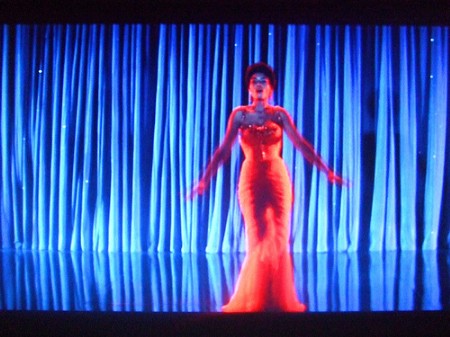Fuse Flash: Four Bold Minutes with Abbey Lincoln
The death of Abbey Lincoln on Saturday August 14, just a week after her 80th birthday, rewound my audio memory to 1959.
By Steve Elman
 I didn’t have to re-listen to “Lost in the Stars,” from her Riverside album Abbey is Blue. I can replay that performance any time I wish, just by thinking about it.
I didn’t have to re-listen to “Lost in the Stars,” from her Riverside album Abbey is Blue. I can replay that performance any time I wish, just by thinking about it.
Abbey was 28 at the time. She already had plenty of experience as a singer, but her voice still had freshness and clarity. There were only occasional hints of the rough edges that would later compromise her control, the sandpapery qualities that she ultimately learned to use for dramatic effect.
In those Riverside days and in her one session for Candid, all the distinctions of her young voice are in balance—a firm sense of pitch, dramatic and declamatory phrasing, and a bright, hard, hornlike timbre. Those performances vary in their artistic merit—there are some agreeable swingers, some sensitive ballads, and some potent expressions of uncompromising racial pride and anti-racist anger. Sometimes there’s a little too much drama for the material.
But “Lost in the Stars” is a bold risk, brilliantly realized.
The raw material most likely appealed to her and to Max Roach (drummer and co-musical director for the session) because of its anti-apartheid credentials. Lost in the Stars, the show that introduced the song 10 years earlier, transferred the pathos of Alan Paton’s South African novel Cry, the Beloved Country to the musical stage. It was Kurt Weill’s last stage score, and the title tune has one of Weill’s most noble melodies, untrammeled by any burlesque or irony.
Maxwell Anderson’s lyric is hardly Brecht, and it’s not even great poetry. It’s one of those folky recastings of religious myth into down-home imagery, a vehicle for a heroic, black baritone, something out of the Paul Robeson tradition. The singer is a preacher in a moment of personal despair. He’s expressing a noble suffering, a doubt of God’s goodness in his dark night of the soul, but we listeners know that his faith will ultimately see him through.

Abbey Lincoln singing from her album Abbey is Blue on the Ed Sullivan Show.
In Abbey’s version, the despair overwhelms the sense of optimism. Orrin Keepnews’s production and Jack Higgins’s engineering emphasize the angst of her vocal with a boomy echo, a use of production effects more blatant than in any other of her Riverside recordings. The metallic quality of the primitive reverb is ham-handed and obvious, and one would think that it would undercut the power of the performance. Instead, the rawness rips the song away from rural South Africa and puts it on an American street. Everything comes together in four minutes of pure urban anomie.
Abbey takes us quietly and patiently through the first lines, with the Lord God sifting the stars through his fingers like grains of sand, permitting one little star to be lost and then found again, and finally promising that he’ll take “special care so it wouldn’t get lost again.”
But as she sings “sometimes it seems maybe God’s gone away . . . and we’re lost out here in the stars,” she colors the words with gall. There’s no hint of a restoration of faith at some time in the future, no sense that salvation awaits. She takes us out into a vast, desolate darkness and leaves us there. (Here’s an excerpt.
Few singers of her time had the courage to do something so bold. Few singers ever have that courage.
===========================
Order Steve Elman and Alan Tolz’s book on legendary talk show host Jerry Williams from the Amazon link below and The Arts Fuse receives a percentage of the sale.
